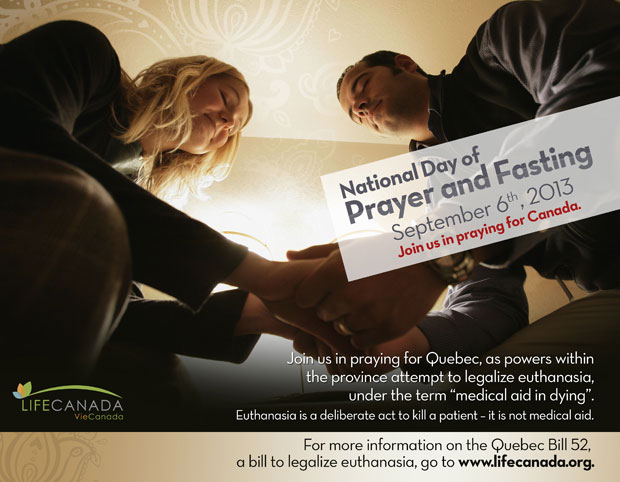National Day of Prayer re: Quebec euthanasia bill

Campaign Life Coalition is one of many Canadian groups that has signed onto a joint statement urging Quebec to withdraw it's murderous Bill 52. The full text of the statement is below.
A joint statement to withdraw Bill 52, a bill to legalize euthanasia
Concerned about the more vulnerable members of our society, we, the undersigned, deplore the legislation proposed in Quebec that would make it legal for a physician to deliberately take the life of his or her patient under circumstances of alleged suffering.
The alleviation of medical suffering is an indispensable element of compassionate health care. Killing the patient, however, is not. Contemporary medicine has made great strides in the relief of suffering, especially in the areas of pain control and palliative care for the dying. But if intentionally causing a patient’s demise becomes embedded in health care, the soul of medicine is subverted. Despite the assurances the bill’s sponsors have offered, we are convinced that many persons living with sickness, advanced age or disability would increasingly be put at risk.
Faced with such a momentous shift in medical ethics and public policy, the very least that citizens in a democracy are owed is honesty as to what is proposed.
Unfortunately, the bill’s true intent is hidden from public view. The accurate term “euthanasia” has been replaced by the confusing euphemism “medical aid in dying.” This language is designed to circumvent the Criminal Code of Canada, by creating the legal fiction that in Quebec “medical aid in dying” is not killing but a form of health care, and thus a matter of provincial jurisdiction immune from federal law.
Let no one doubt: “medical aid in dying” is patient killing.
The key question that must be addressed is stark yet profound: Is killing a legitimate part of health care? Should doctors be licensed to kill their patients?
In solidarity with many doctors and others in Quebec, we emphatically answer in the negative. Our reason is that the underlying philosophy of the euthanasia movement – that life, when lacking a certain quality, is expendable - profoundly undermines the common good and leads to mortal danger for many of the most vulnerable members of society.
We know that with the acceptance and legalization of such a practice comes an immense loss of commitment to people’s lives, a loss of incentive to provide quality end of life care, a weakening of the resolve of the health care profession to truly work for the benefit of patients, and an opening for abuse of the vulnerable who have no one to advocate for them.
In countries like Holland and Belgium euthanasia increasingly applies to those who are not terminally ill. The list of qualifying medical conditions grows larger. Legal restrictions designed to limit the practice to those who choose it are disregarded and abuse becomes common. Authoritative voices have sounded an alarm1.
An entirely different path of health care is possible, one that is deeply compassionate, legitimate, that builds on past medical progress to deliver quality end of life care to all those in need, and that kills the pain without killing the patient. It is a path based on the premise that every person, no matter how ill or weak, has an inherent and irrevocable dignity. Indeed, it is this dignity that is the foundation and basis for all human rights.
Today, palliative care physicians have the tools and the training necessary to allow their patients to die peacefully and naturally, yet currently only 16 % – 30% of Canadians have access to palliative care.2
Will euthanasia further erode the incentive to provide high quality palliative care that all Canadians deserve? We are concerned that faced with rising costs and an aging population, euthanasia, under the guise of ‘medical aid in dying’ could be used to balance health care budgets.
Quebec is at a crossroads, one that could easily impact what happens beyond its borders. Quebecers are known for their compassion toward the weak and marginalized. Will that tradition now be strengthened, or undermined?
These are some of the concerns felt by those who have signed this document. We condemn the push in Quebec to legalize the dangerous practice of patient killing. Despite its innocuous guise, “medical aid in dying” is a door too dangerous to open. We respectfully call on the bill’s sponsors to withdraw their proposal.
Respectfully signed,
Campaign Life Coalition
Footnotes:
1. See European Institute on Bioethics, Euthanasia in Belgium: 10 Years On, www.ieb-eib.org April 2012; Kenneth Chambere et al., “Physician-Assisted Suicides Under the Euthanasia Law in Belgium,” Canadian Medical Association Journal Vol. 182, No. 9 (15 June 2010); National Advisory Committee on Ethics, France, “End of Life, Personal Autonomy, Wish to Die,” Notice No. 121, www.ccne-ethique.fr 1 July 2013.
2. The Canadian Hospice Palliative Care Association, Fact Sheet, May 2012. http://www.chpca.net/media/7622/fact_sheet_hpc_in_canada_may_2012_final.pdf
To learn more about the tremendous evil that euthanasia and assisted suicide would unleash upon Canadian society, especially those who are most vulnerable, watch our Slippery Slope video:
